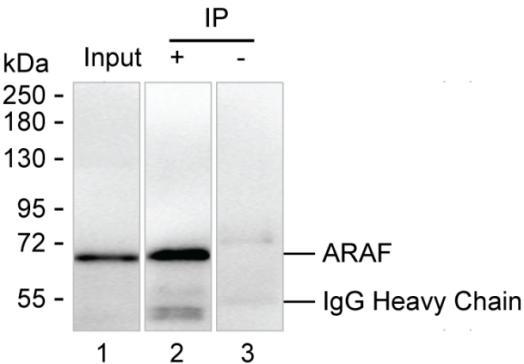
| WB | 咨询技术 | Human,Mouse,Rat |
| IF | 1/100-1/200 | Human,Mouse,Rat |
| IHC | 咨询技术 | Human,Mouse,Rat |
| ICC | 技术咨询 | Human,Mouse,Rat |
| FCM | 咨询技术 | Human,Mouse,Rat |
| Elisa | 咨询技术 | Human,Mouse,Rat |
| Host/Isotype | Mouse IgG2a |
| Antibody Type | Primary antibody |
| Storage | Store at 4°C short term. Aliquot and store at -20°C long term. Avoid freeze/thaw cycles. |
| Species Reactivity | Human |
| Immunogen | Purified recombinant fragment of human ARAF |
| Formulation | Purified antibody in PBS with 0.05% sodium azide |
+ +
以下是关于ARAF抗体的3篇代表性文献的简要信息(注:以下内容为示例性整理,具体文献可能需要根据实际数据库检索确认):
---
1. **文献名称**: *"ARAF mutations in human cancers: Role in MAPK pathway activation and therapeutic implications"*
**作者**: Davies H., et al.
**摘要**: 该研究通过免疫组化(使用ARAF特异性抗体)和测序技术,分析了多种癌症中ARAF基因的突变频率及其对MAPK信号通路的激活作用,揭示了ARAF作为潜在治疗靶点的价值。
---
2. **文献名称**: *"Development and validation of a monoclonal antibody for specific detection of ARAF in Western blot and immunofluorescence"*
**作者**: Roberts P.J., Der C.J.
**摘要**: 研究团队开发了一种高特异性的ARAF单克隆抗体,验证了其在蛋白质印迹(Western blot)和免疫荧光中的应用,并证明其能有效区分ARAF与同家族蛋白BRAF和CRAF,为信号转导研究提供可靠工具。
---
3. **文献名称**: *"ARAF knockdown combined with antibody-based functional screening reveals its role in colorectal cancer cell proliferation"*
**作者**: Emery C.M., et al.
**摘要**: 通过CRISPR敲低ARAF表达并结合ARAF抗体进行功能验证,研究发现ARAF缺失可抑制结直肠癌细胞增殖,提示其作为生物标志物或治疗靶点的潜力。
---
如需获取具体文献,建议通过PubMed或Web of Science以“ARAF antibody”、“ARAF kinase detection”等关键词检索,并筛选近年高被引论文。
**Background of ARAF Antibody**
The ARAF (A-Raf) antibody is a crucial tool for studying the ARAF kinase, a member of the RAF family (ARAF, BRAF, and CRAF) within the MAPK/ERK signaling pathway. This evolutionarily conserved pathway regulates critical cellular processes, including proliferation, differentiation, and survival. ARAF, though less studied than BRAF or CRAF, plays a context-dependent role in signal transduction, often acting as a modulator or secondary effector in specific tissues.
ARAF antibodies are designed to detect and quantify ARAF protein expression, phosphorylation status, or interactions in experimental models. They are widely used in techniques like Western blotting, immunohistochemistry (IHC), immunofluorescence (IF), and co-immunoprecipitation (Co-IP). Such antibodies help elucidate ARAF's functional dynamics, particularly its activation mechanism (e.g., RAS binding, dimerization, or phosphorylation) and its crosstalk with other RAF isoforms or downstream targets (e.g., MEK/ERK).
Research applications often focus on ARAF's involvement in diseases, especially cancer. While BRAF mutations are more commonly linked to malignancies (e.g., melanoma), ARAF alterations or dysregulated expression have been implicated in certain cancers (e.g., colorectal, lung) and developmental disorders. ARAF antibodies also aid in evaluating therapeutic responses, as RAF inhibitors may differentially target ARAF in drug-resistant contexts.
These antibodies are typically validated for specificity (e.g., cross-reactivity checks with BRAF/CRAF) and optimized for human, mouse, or rat samples. Their utility extends to both basic research and preclinical studies, advancing understanding of RAF isoform-specific signaling and therapeutic targeting.
×